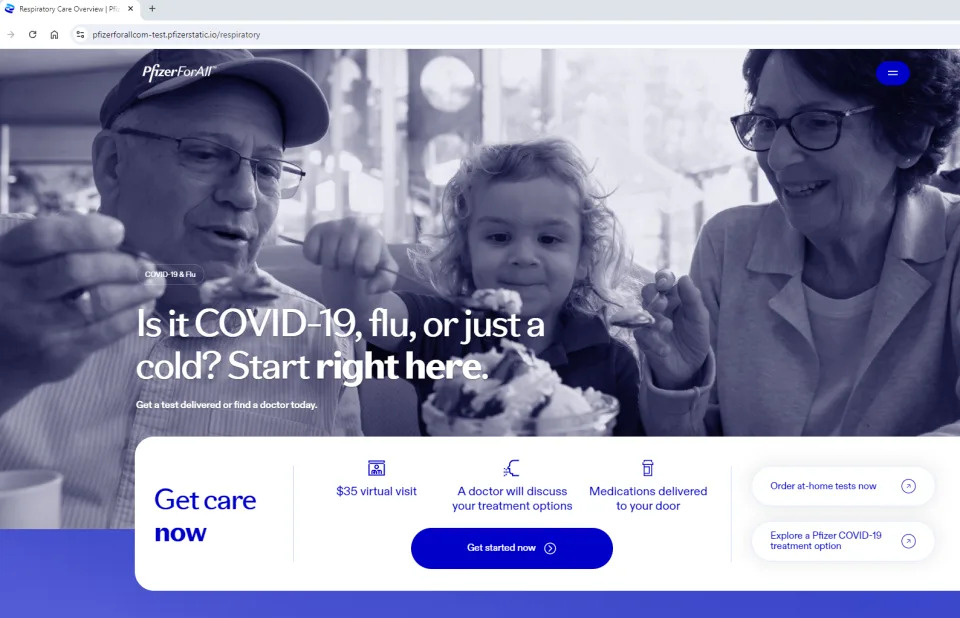On Tuesday, Pfizer ( PFE ) said it will enter the direct-to-consumer business, following the lead of a Big Pharma rival, Eli Lilly ( LLY ), which launched a similar plan in January.
The new website and patient platform, called PfizerForAll, aims to help patients more quickly access migraine treatments as well as vaccines and treatments for respiratory viruses like COVID-19 and the flu. While these are all products of Pfizer, the company contends that patients will not be forced to choose a Pfizer drug. That decision, they say, will remain in the hands of clinicians.
Pfizer chief US commercial officer Aamir Malik told Yahoo Finance the company is hoping to make access to medicines easier. "Navigating our healthcare system is time-consuming. It's complicated. It's overwhelming. And the last thing that anybody needs when they're trying to get the care that they need for themselves or a loved one is to have to navigate that complex, painful, difficult system," Malik said.
Malik and others point out that patients often have to search for doctors who can write the prescriptions they need quickly — or even find a doctor who will see them in a timely manner, Malik said.
Adding to the complexity is the insurance process, which involves various coverage hurdles, such as pre-authorization requests and the hunt for a pharmacy that can dispense the drug at a lower co-pay cost.
But Pfizer's goal isn't to eradicate that complex system. Instead, Malik emphasized that the new portal will simply serve as an additional avenue for patients to get the drugs they are already familiar with, and also introduce new patients to the drugs. (It won't be able to help with drug shortages, as that issue rests with drug manufacturers.)
In addition, the site will have a customer helpline for patients if they run into any of the usual hurdles. That includes contacting the insurer to remove any access barriers or guiding the patients on how to contact the insurers themselves if needed.
How it works
Pfizer will use social media ads to find patients and funnel them to the new portal. The entry point will be whatever health problem the patient is trying to resolve, such as addressing migraine pain. That will lead to a specific landing page, which will offer a telehealth visit through a third-party vendor, UpScript, for $35 or an in-person visit with the booking portal ZocDoc.
At that point, the patient is outside of the Pfizer portal and has a visit with a clinician who can prescribe an appropriate drug. This could be a Pfizer drug — or not, Malik said.
There is no revenue sharing from the clinical visits or the prescriptions, which means that clinicians aren't getting paid or sharing in profits of the sales if they prescribe a Pfizer drug.
Patients can then get the drug mailed or pick it up at their regular pharmacy. In the case of vaccines, Pfizer will help book appointments at major retail pharmacies CVS ( CVS ) or Walgreens ( WBA ), which have more than 17,000 locations combined across the country — and more pharmacies anticipated in the future. Under respiratory care, Pfizer will also offer access to at-home tests through Instacart ( CART ) the same day or via two-day shipping from Amazon ( AMZN ).
Pfizer said that the company doesn't see this as a profit-focused business. "We're not building this as a standalone business with a revenue and a profit objective to it," Malik told Yahoo Finance. "We're not holding revenue targets to PfizerForAll." Instead, the company will measure success on how popular the site is.

The market
Eli Lilly launched its site, LillyDirect, earlier this year to help patients with diabetes, obesity, and migraines.
Lilly CEO David Ricks noted that the telehealth solution helps obesity patients the most — especially those hunting for its blockbuster drug, Zepbound. He told Yahoo Finance in January that "patients report doctor shopping" for someone who will write their prescription. That's why the site, in addition to offering telehealth, can also help find an obesity specialist by zip code.
LillyDirect is similar to PfizerForAll in that it relies on replicating the traditional pathway to get a prescription. But the clinicians are different. Whereas Pfizer is using one platform for telehealth and ZocDoc for doctor's visits, Lilly is using three different telehealth platforms.
For diabetes and obesity, Lilly is using 9amHealth, which accepts a limited number of insurance plans only in Texas and California. It is unclear if patients in other states have access. Lilly is also using FormHealth for obesity, which accepts most major insurers and Medicare. For migraine treatments, the company partnered with Cove, which accepts insurers and has a $30 copay or costs $99 for a visit without insurance.
Compare that to the $35 flat fee through Pfizer for UpScript.
In the eight months since its launch, it is unclear how well LillyDirect is doing. Lilly declined to provide Yahoo Finance with updates on traffic to the site.
In a first quarter earnings call in April, Lilly USA Diabetes and Obesity president Patrik Jonsson said that the site was "gaining traction by weeks." But in response to a question about tracking prescriptions for GLP-1 weight loss drug Zepbound, Jonsson said, "It's relatively low volume that goes through LillyDirect."
But new patients, who are filling prescriptions for the drug for the first time in their lives through the site, was slightly higher, he said. No specific numbers were provided.
Anjalee Khemlani is the senior health reporter at Yahoo Finance, covering all things pharma, insurance, care services, digital health, PBMs, and health policy and politics. That includes GLP-1s, of course. Follow Anjalee on most social media platforms @AnjKhem .





